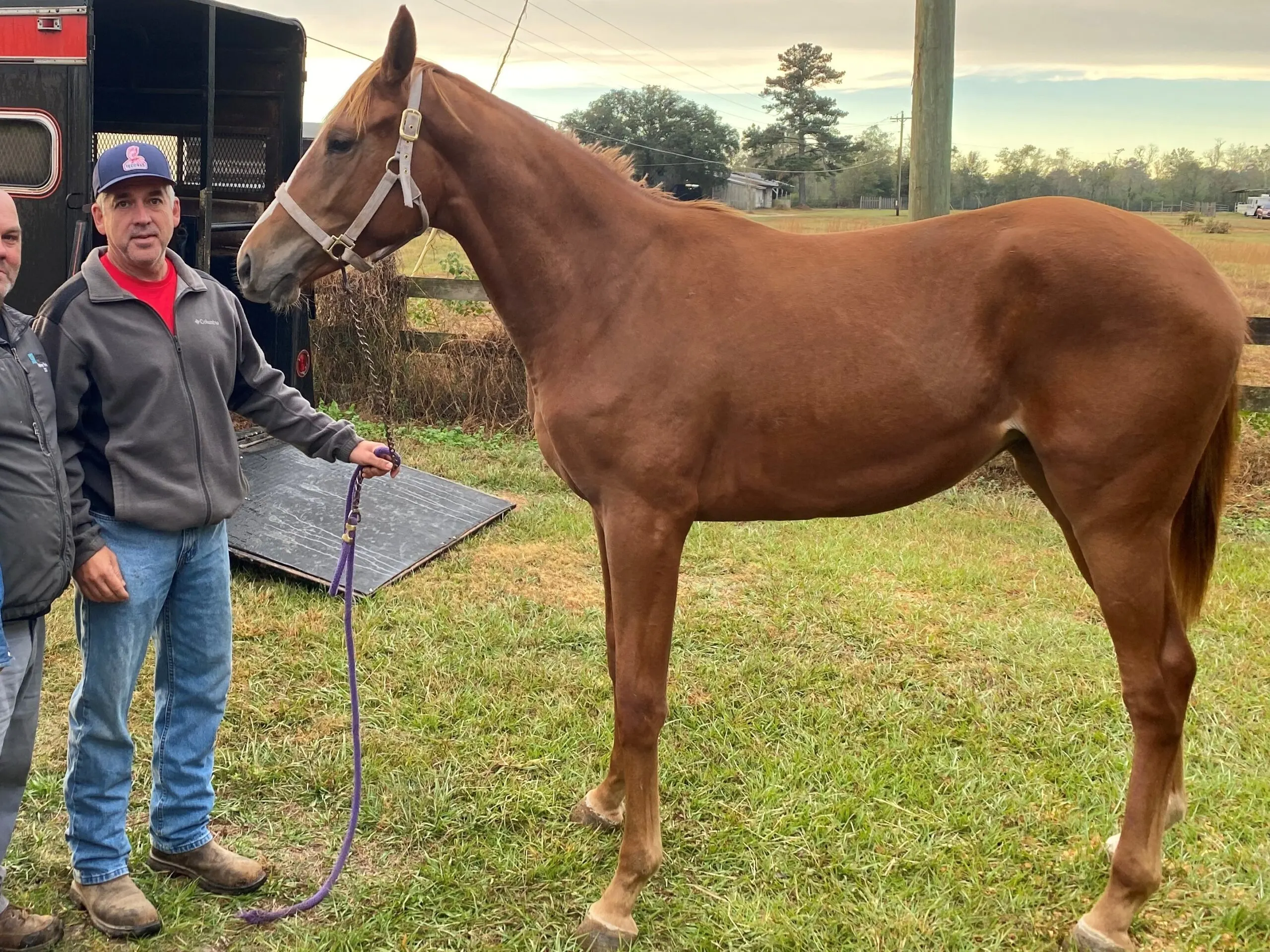Last updated: August 3, 2023
Any links on this page that lead to products on Amazon are affiliate links and I earn a commission if you make a purchase. Thanks in advance – I really appreciate it!
Eating horse meat never crossed my mind as a kid, even though I’ve always lived around horses. Now that I think about it, what stops us from eating horse meat since most Americans aren’t vegans?
We don’t eat horse meat because of horses’ long-standing cultural and historical significance. Horse meat isn’t regulated or legalized by the US government either, so there’s no guarantee it’s safe for human consumption, and most people see horses as pets and taboo to eat.
The laws regarding eating horses aren’t clear. For instance, can you legally slaughter and eat your horse? Many people profit from exporting horses to slaughterhouses abroad. Also, is eating horse meat ethical, and why did Americans stop eating horses? Let’s learn more below.

Horse Meat Consumption Around the World
Horse meat, while a taboo subject in some cultures, is a part of the culinary traditions in various regions of the world. Let’s delve into where horse meat is commonly consumed and the diverse cultural perspectives on eating it.
A Breakdown of Countries Where Horse Meat is Commonly Consumed:
- Kazakhstan: In Kazakhstan, horse meat is an essential part of the national cuisine. Dishes like “Beshbarmak” showcase horse meat as a key ingredient.
- Italy: In regions like Veneto, horse meat can be found in specialty dishes. It’s prepared in various ways, from stews to steaks.
- France: Horse meat has a long history in French cuisine. Though not as popular today, it is still consumed in particular areas and specialty restaurants.
- Japan: Known as “Sakura Niku” or cherry blossom meat, horse meat is eaten raw in dishes like “Basashi.” It’s particularly popular on the southern island of Kyushu.
- Belgium: Horse meat is enjoyed in stews and sausages, reflecting a tradition that dates back centuries.
- Other Countries: Various other countries, including Mexico, Switzerland, and some South American nations, have localized traditions of consuming horse meat.
Cultural Perspectives on Eating Horse Meat:
The cultural acceptance of horse meat varies widely around the globe.
- In places like Kazakhstan, the horse has significant cultural symbolism, and consuming horse meat is a respected tradition.
- Conversely, in countries like the United States and the United Kingdom, eating horse meat is generally frowned upon. This aversion is often tied to the historical relationship with horses as companions and working animals.
- Religious beliefs also play a role. In some Islamic and Jewish traditions, horse meat is considered non-kosher or non-halal.
Horse meat consumption is indeed a complex issue with deep cultural roots. While it is embraced in some cultures as a traditional and nutritious food, it faces opposition in others for ethical, historical, or religious reasons. The global perspective on eating horse meat reveals a fascinating tapestry of culinary diversity and cultural values.
Legality of Consuming Horse Meat
The consumption of horse meat is a subject often surrounded by legal complexities. These legalities vary widely between countries, and sometimes even within regions of the same country. Below, we’ll explore both where horse meat is legal and illegal and the regulations governing its slaughter and sale.
Overview of Countries Where Horse Meat is Legal or Illegal:
- Legal Countries: Many European countries, including France, Belgium, and Italy, allow the consumption, slaughter, and sale of horse meat. It is also legal in countries like Kazakhstan, Japan, and Mexico.
- Illegal Countries: In places like the United States, the consumption of horse meat is not expressly illegal, but the slaughter of horses for human consumption has been effectively banned through defunding of inspections. Other countries, like India, explicitly prohibit the slaughter of horses for meat.
- Grey Areas: Some countries fall into a grey area, with no specific laws regarding horse meat but cultural taboos or other indirect regulations limiting its consumption.
Regulations Regarding the Slaughter and Sale of Horses for Meat:
- European Union: Within the EU, horse meat production is regulated by strict health and safety guidelines. Horses must be declared fit for human consumption, and their medical history is tracked.
- Canada: Canada’s federal regulations ensure that horse meat processing follows specific standards related to animal welfare and food safety.
- Australia: While the consumption of horse meat is legal, the industry is minimal, with strict regulations regarding animal welfare and slaughter practices.
- Challenges and Controversies: Even in countries where horse meat is legal, the industry is often challenged by animal rights activists and ethical concerns. Mislabeling and scandal, such as the 2013 European horse meat incident, have led to increased scrutiny and tighter regulations.
The legality of consuming horse meat is far from uniform across the globe. Cultural, ethical, and historical factors often play a significant role in shaping the laws and regulations surrounding this contentious issue.
Understanding the legal landscape of horse meat consumption requires delving into the intricate web of local customs, religious beliefs, and individual laws that govern this unique aspect of our global food culture.
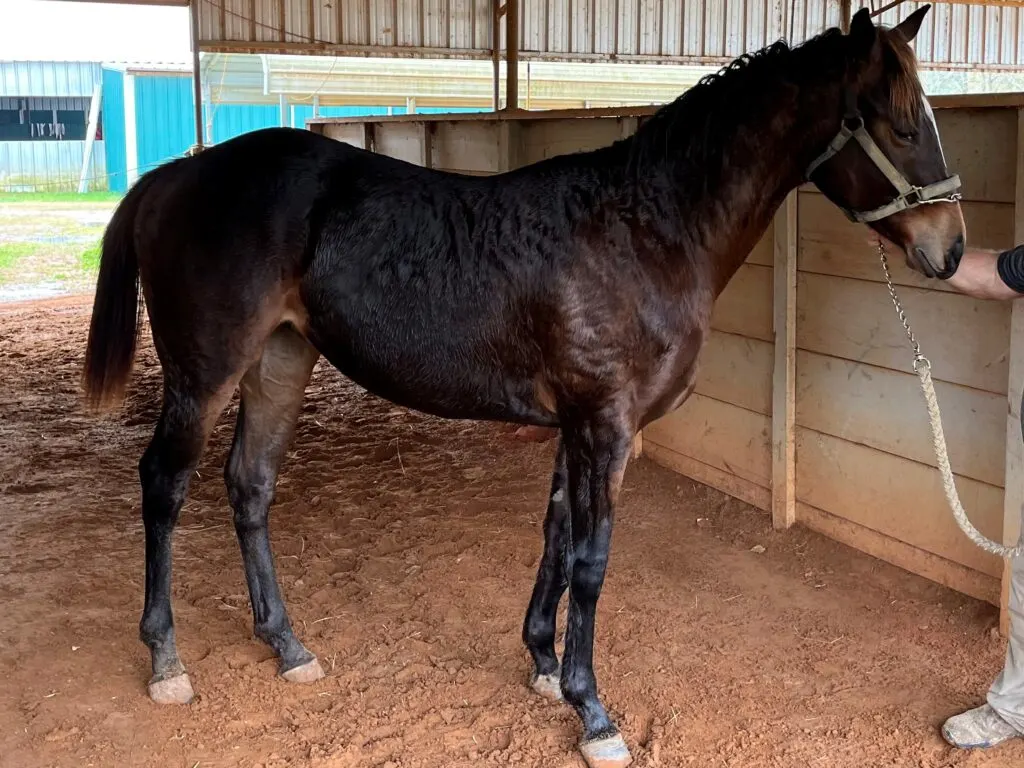
The Dangers of Eating Horse Meat
While horse meat is enjoyed as a delicacy in various cultures, there are several concerns that arise from its consumption. These concerns can be broadly categorized into health risks, environmental impacts, and ethical considerations. Here’s an in-depth look into each:
The Health Risks Associated with Consuming Horse Meat:
- Contamination Risks: Horses are often treated with medications and substances that are not intended for human consumption. If not properly tracked and regulated, these can enter the food chain.
- Allergic Reactions: Some individuals may experience allergic reactions to horse meat, though this is relatively rare.
- Food Safety Regulations: In regions where horse meat consumption is not common, regulations and inspection standards may be lacking, leading to a higher risk of contaminated or spoiled meat.
Environmental Impact:
- Resource Usage: Similar to other livestock, raising horses for meat requires significant resources, such as water and feed, which can have environmental implications.
- Waste Management: The disposal of waste products from horse slaughtering can impact local ecosystems if not managed properly.
- Sustainability Concerns: Depending on the methods used in raising and slaughtering horses, there can be questions about the sustainability of horse meat as a food source.
Ethical Concerns:
- Animal Welfare: The treatment of horses raised for slaughter can be a major ethical concern, particularly in regions where regulations may be lax or poorly enforced.
- Cultural Sensitivities: As horses are often viewed as companion animals, the idea of consuming them as food is highly controversial in many cultures. This cultural connection to horses raises significant ethical questions.
- Mislabeling and Fraud: There have been instances of horse meat being mislabeled as other meats, leading to consumer deception and trust issues within the food industry.
The consumption of horse meat is not just a matter of personal preference or cultural tradition; it involves various complex issues that merit consideration. From the potential health risks and environmental impacts to the ethical concerns that surround the industry, the decision to consume horse meat carries weight beyond mere taste.
Cultural and Personal Perspectives
The consumption of horse meat is not simply a matter of legality or health; it’s deeply entwined with cultural norms, personal values, and even religious beliefs. In this section, we will explore the various reasons why some individuals choose to eat horse meat while others firmly avoid it.
Common Reasons People Choose to Eat Horse Meat:
- Culinary Tradition: In many cultures, horse meat is a traditional food enjoyed for its unique flavor and texture. From Italian stews to Japanese sashimi, horse meat is a celebrated ingredient in various cuisines.
- Nutritional Value: Horse meat is known for being lean and rich in certain nutrients like protein and iron. Some choose to consume it for these nutritional benefits.
- Economic Factors: In some regions, horse meat may be more accessible or affordable than other types of meat, leading to its consumption.
Common Reasons People Avoid Horse Meat:
- Ethical Concerns: Many people feel a special connection to horses as companions and working animals. This bond leads some to view the consumption of horse meat as ethically unacceptable.
- Religious Beliefs: Certain religious traditions, such as Judaism and Islam, may have specific guidelines or prohibitions regarding the consumption of horse meat.
- Cultural Taboos: In some Western countries, eating horse meat is considered taboo, often rooted in historical relationships with horses.
- Health Concerns: The potential health risks associated with consuming horse meat, as discussed earlier, may deter some individuals from eating it.
Religious and Cultural Factors Influencing These Choices:
- Religious Guidelines: Religious beliefs often guide dietary choices, and horse meat is no exception. Specific religious teachings may encourage or prohibit its consumption.
- Cultural Heritage: The role of horses in a culture’s history and mythology can deeply influence attitudes towards eating horse meat. Whether seen as sacred, symbolic, or simply utilitarian, these cultural perspectives shape individual choices.
The decision to eat or avoid horse meat is a multifaceted one, influenced by a complex interplay of personal preferences, cultural norms, and religious beliefs. From embracing horse meat as a cherished culinary tradition to rejecting it for ethical or health reasons, the spectrum of perspectives on this issue is as diverse as the global community itself.
Here is chart comparing the nutritional value of Horse Meat to Beef and Pork.

The 3 Primary Reasons We Don’t Eat Horse Meat in the US.
Pretty much every horse owner I’ve talked to considers eating horse meat a taboo. Even outside the horse community, the general public isn’t prepared to eat meals made with horse meat. So, what led the US population to build such sentiments? Here are my thoughts:
- Horses are Part of Our Heritage and Often Considered Pets in the US: The horse has a rich symbolic connection with American history, symbolizing freedom and the pioneering spirit. Moreover, many Americans view horses not just as working animals but as beloved pets. This close emotional bond with horses, akin to that with dogs and cats, contributes to a widespread cultural resistance to the idea of consuming horse meat.
- Horse Meat May Be Infected with Harmful Drugs: Unlike animals specifically raised for food, horses in the US are often treated with medications and substances not approved for human consumption. Consuming horse meat that has not been properly regulated poses a significant health risk. This concern has led to strict regulations and even bans on horse slaughter for meat in many states.
- Horses’ Spiritual Role in Society: Horses are also seen as noble and spiritual creatures in various American cultural and religious contexts. Many Native American tribes, for example, regard horses with deep spiritual significance. This spiritual connection amplifies the ethical concerns around consuming horse meat, making it not just a dietary choice but a moral and spiritual one as well.
These reasons, encompassing cultural heritage, health risks, spiritual significance, and the perception of horses as pets, form a complex rationale for why horse meat is not commonly consumed in the United States. Together, they illustrate a societal stance that largely rejects horse meat as an acceptable food source.
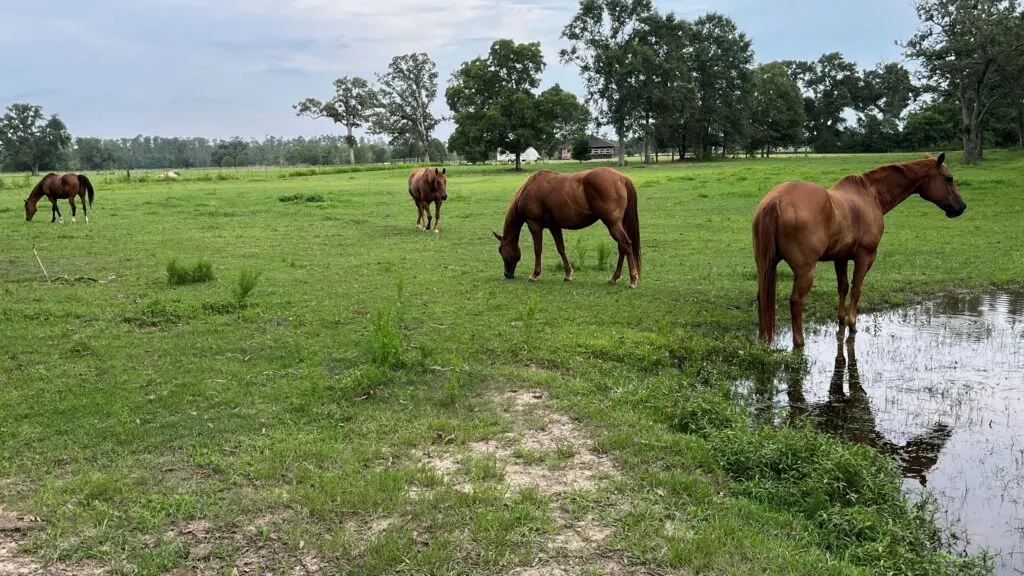
The Law and Horse Meat for Human Consumption in the U.S.
You might’ve wondered if it’s possible or legal to eat horse meat in the United States. Growing up in the Louisiana, I’ve eaten many different animals, from alligator meat to raccoons. However, I’ve never known anyone who ate horse meat.
It’s not illegal to eat horse meat in the United States. However, it is illegal to sell a horse for commercial human consumption. Though no federal laws ban the consumption of horse meat, some states have explicit laws prohibiting the sale or slaughter of horses intended for human consumption.
Horse meat wasn’t always wholly illegal in the US. Until 2005, the Food and Safety Inspection Service (FSIS) inspected and regulated horse meat from slaughterhouses. (The FSIS is an extension of the United States Department of Agriculture (USDA).
The battle over horse meat inspection.
In 2005, animal rights activists raised concerns regarding the sale of horse meat, so the government made the inspection of horses a paid service. However, it didn’t stop there, and soon the FSIS was prohibited from spending funds to perform inspections on horses intended for human food.
Since meat not regulated by the FSIS/USDA is illegal to sell because it could be degraded, there’s no market for selling horse meat in the US, thus no way to make money selling horses for consumption.
The USDA has also banned the import of horse meat from foreign countries. However, there’s an active business selling horse meat in Canada and Mexico. In fact, many horses in the US are regularly shipped to other countries for slaughter.
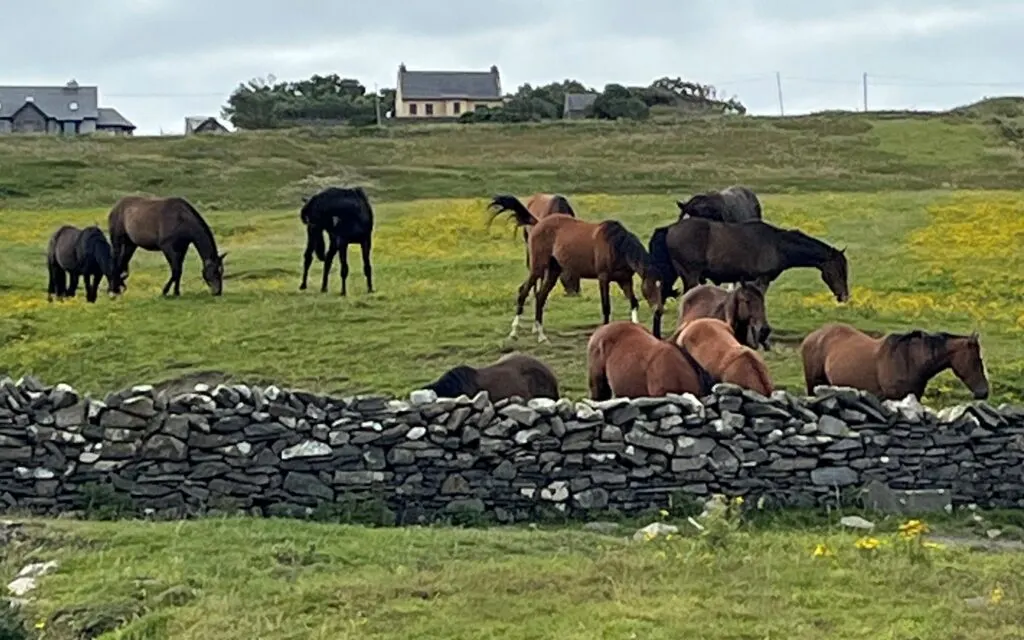
States have their own laws governing horse meat.
While selling horse meat is a no-go, the slaughtering of horses for their meat isn’t technically illegal in many states. California has strict laws against any activities related to horse slaughter. Other states like New York, New Jersey, Florida, and Oklahoma also prohibit slaughtering a horse.
I should point out that “horse slaughter” is not the same as euthanizing horses, which is generally considered a humane and legal practice under certain circumstances.
The shutdown of the last remaining horse slaughterhouses.
By 2007, the last three horse slaughterhouses in the US shut down. Two of these were in Texas, and one was in Illinois. Due to this, buying horse meat or selling it at a public restaurant became almost impossible.
Debates are often brought up in horse communities if the government should make horse meat legal. There have been frequent attempts to pass bills to regulate the sale or slaughter of horses, but there aren’t enough votes in Congress yet.
Supporters argue that since eating horses is widely accepted outside the US, American owners denied the right to slaughter or sell horses usually export unwanted equines to Mexican slaughterhouses with cruel environments–unlike when Americans did the job themselves (often under USDA supervision).
In contrast, there has been a constant struggle by animal rights activists to ban the export of horses that might be intended for slaughter. Still, given the complexity of the case and potential economic losses, no such law has yet been announced.
Regardless of whether or not horse slaughter ever becomes legal in the US, you are legally free to slaughter and consume horse meat for personal use. You can even serve it to your guests as long as you don’t make any profit from it.
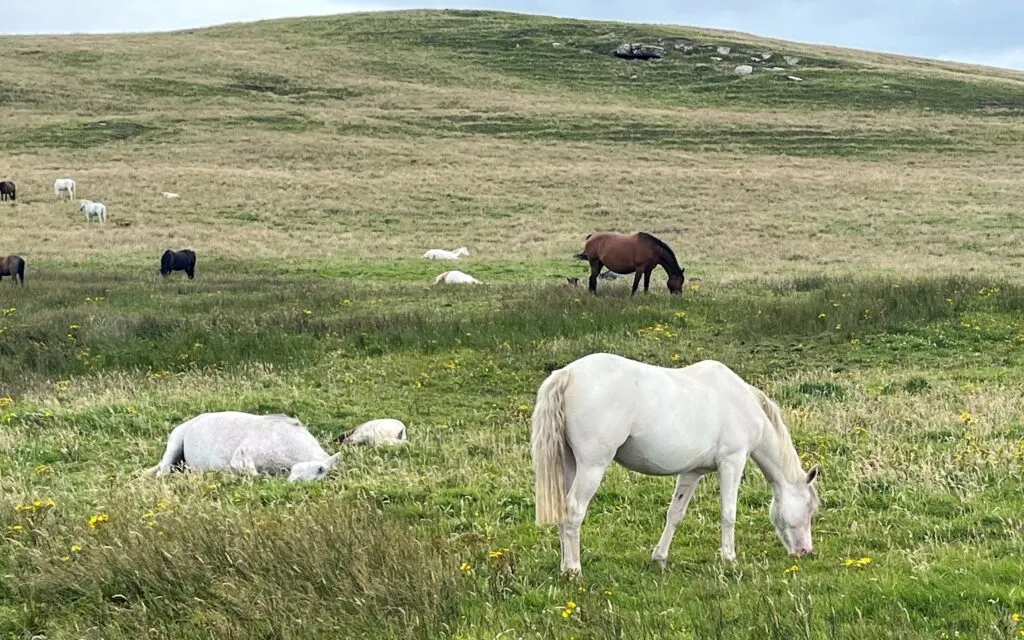
Could Wild Horses be a Viable Food Source?
To give an example of the taboo against eating horse meat, overpopulation is the greatest threat to wild horses. The containment and management measures are often inhumane and brutal to the horses. Yet, no one wants to use these animals as a food source.
People have suggested legalizing euthanasia or adding horsemeat to the American menu, but public opinion remains firmly opposed. Is the answer educating the public on the benefits of horse meat, or are the negative connotations associated with eating horse meat too ingrained in our society?
What Does Horse Meat Tastes Like?
Horse meat is usually described as a cross between venison and beef. It tastes a little sweet and has a pleasant touch of gaminess. It’s leaner than beef and generally tender. Like most animals, meat from younger horses is light pink, while meat from senior horses is darker and reddish.
Horse meat is a healthy source of nutrition like proteins and certain minerals and vitamins. Compared to beef, it has a similar level of proteins, lower levels of fats, cholesterol, and calories, and more omega-3 fatty acid content.
During World Wars I and II, when beef prices soared, people turned to horse meat as a cheaper alternative. However, the practice was publicly frowned upon, and the horse meat was often fraudulently mixed with other products.

Does McDonald’s Use Horse Meat?
Buying fast food always comes with its risks. I frequently eat at McDonald’s and was recently told they use horse meat in their hamburgers. Given past scandals in the food industry, is it safe to trust McDonald’s?
McDonald’s states they don’t use horse meat in any of their products. In the US, their ingredients are approved by the Food and Drug Administration, and there aren’t any recorded instances of horse meat found in McDonald’s food.
In 2013, a European food scandal shook the market when customers learned popular food companies were adding unregulated horse meat to what were supposed to be beef burgers. Though people became more cautious of what the food industry sells, McDonald’s was never proven to use horse meat in its products.
McDonald’s promises that its patties are made of 100% beef and free from preservatives or fillers. And being the largest fast-food company globally, its standards are regularly tested for efficacy and food quality.
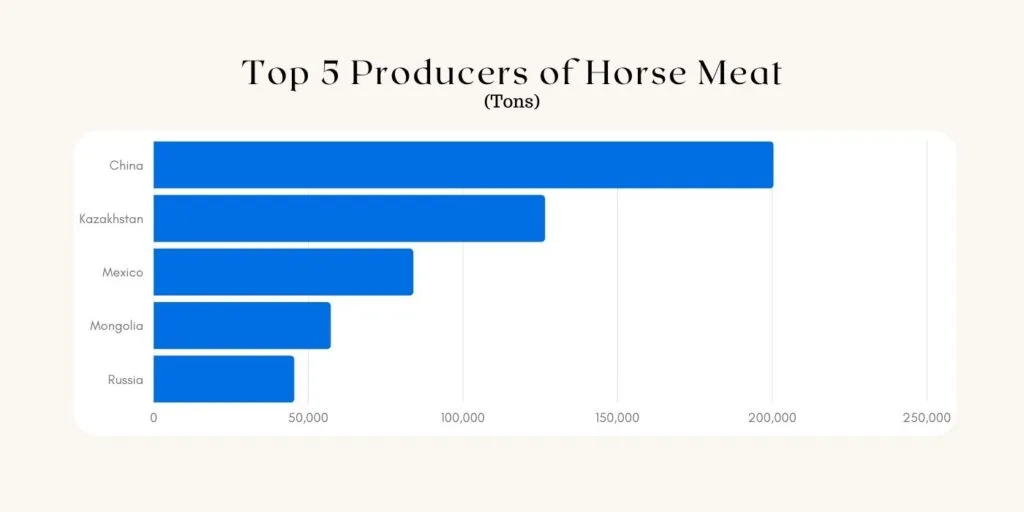
What Country Eats the Most Horse Meat?
Horse meat may not be a thing in the US, but it is very much savored in other countries worldwide. In fact, the first domesticated horses, more than 5,000 years ago, were supposedly kept as a food source.
Raising horses for slaughter is a mainstream business in many countries. One estimate states that almost five million horses are slaughtered each year for meat consumption throughout the world. Nearly half of the global horse meat is produced in Asia, and about 25% is produced in the Americas (mostly from Mexico)
China produces and eats the most horse meat in the world. A 2018 figure put the number of horses slaughtered in China at 1.6 million, and the total amount of horse meat produced was approximately 220,100 US tons.
However, it’s worth noting that although horse dishes are famous in certain Chinese regions, a lot of subcultures consider horse meat unhealthy and unappetizing food. The idea of eating horse meat may be foreign and questionable to many people, but it’s actually an acquired taste with benefits that are hard to ignore.
Horse meat has been shown in studies by scientists from around the world as being high in protein which can help improve your health. Horse meat is typically not looked upon favorably in most regions of the US, UK, Australia, Brazil, Ireland, and religiously active societies like Israel, Saudi Arabia, and parts of Asia.
But it is considered a delicacy and often a staple food in other countries of the world. And during Ghengis Khan’s reign, warriors often relied on horse meat during long excursions when food sources were scarce.
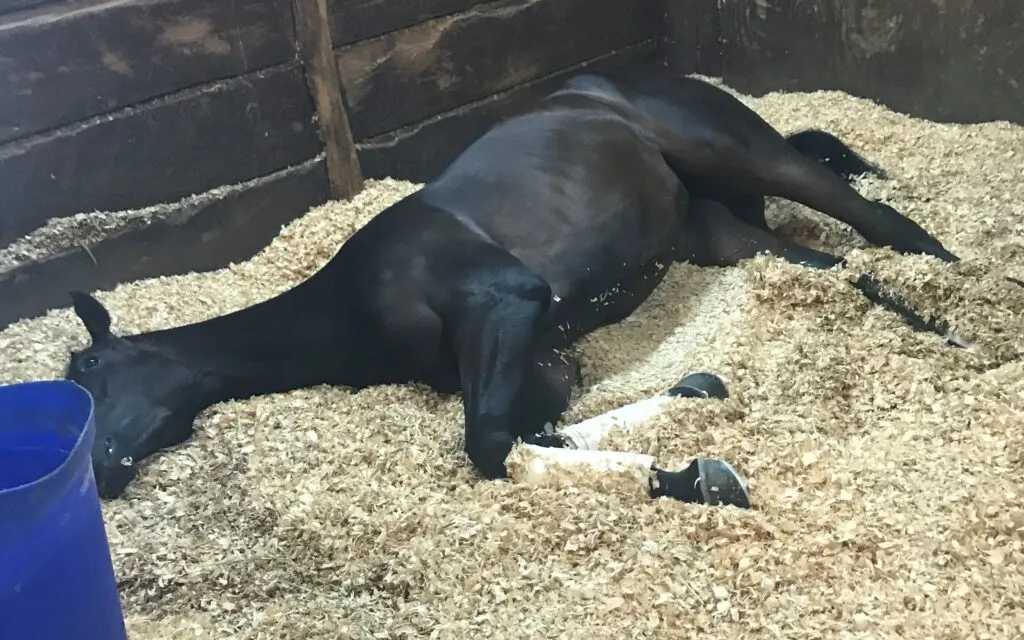
What are Dead Horses Used For?
I’ve grown up hearing the phrase “dead horses” are sent to the glue factory.” Is this a fact or just a rumor? What are dead horses used for instead? Dead horses are commercially used to prepare glue as horses’ tendons, hooves, and bones are rich in collagen.
Though this practice is still found throughout the world, animal glue has been mostly taken over by synthetic adhesives. Collagen, which is a simple form of gelatin, is a crucial ingredient in glues. It is naturally found in the connective tissues of mammals.
Since horses and other cattle can provide large amounts of collagen, they’re the obvious choice for raw material when producing animal glue. However, you shouldn’t generally have to worry about horse or animal remains in glue-based products.
Horse glue is fairly outdated – it takes longer to set, and only some companies use it in specific areas like woodworking, bookbinding, mending antique objects, or pipe organs. Dead horses are also composted.
Composting is a natural process where bacteria break down animal carcasses to prepare a soil amendment. While it may seem more complicated than just burying the horse or throwing them into a vacant field, there are many benefits to doing so for yourself and your garden!
Composting a dead horse can be made even easier by hiring an expert to advise you. They will ensure that the process is done carefully and correctly, which means your composted animal carcasses are finally put to use.
Below is a YouTube video addressing why we don’t eat cats, dogs, and horses.
FAQ
Can you buy horse meat in the US?
You can’t buy horse meat for human consumption in the United States. One reason is that all meat sold to the public must be inspected by the USDA, and they have no horse meat inspectors.
Is it safe to eat horse meat?
Some people say that eating horse meat is safe, while others warn against it. So what should you do? Make up your own mind after doing your research. But whatever you decide, be sure to cook the meat properly so that you don’t get sick.
Is it legal to eat horse meat in the United States?
It is legal to eat horse meat in the United States, and some people do. However, horse meat can’t be sold for human consumption. So, you have to butcher your horse or have someone share theirs.
Meet Miles Henry
An avid equestrian and seasoned racehorse owner, Miles Henry brings his extensive experience to the equine world, proudly associating with the AQHA, The Jockey Club, and various other equine organizations. Beyond the racetrack, Miles is an accomplished author, having published various books about horses, and is a recognized authority in the field, with his work cited in multiple publications.
🔗 Connect with Miles:
Twitter
Facebook
YouTube: Check out race highlights, horse care tips, and more!

